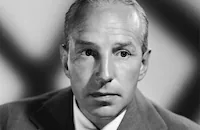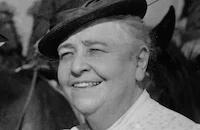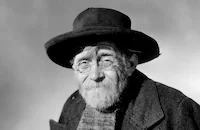It Happened in Flatbush

Brief Synopsis
Cast & Crew
Ray Mccarey
Lloyd Nolan
Carole Landis
Sara Allgood
William Frawley
Robert Armstrong
Film Details
Technical Specs

Synopsis
When the manager of the Brooklyn baseball team quits, team owner Mrs. "Mac" McAvoy decides to hire Frank Maguire as his replacement, despite the warnings of her talent scout, Sam Sloan. Seven years before, Frank was Brooklyn's shortstop, but after a mistake he made during play cost the team the pennant, he left town. Mrs. Mac believes that Frank is a great judge of the game, however, and knows that he was run out of town partially because of adverse publicity created by vitriolic sports columnist Danny Mitchell. Mrs. Mac finds Frank coaching in a small town, and in spite of his remaining bitterness, he agrees to return to Brooklyn for her sake. When he arrives home though, he learns that Mrs. Mac has suffered a fatal heart attack, and that her heirs, including her neice, Kathryn Baker, want to sell the team. Frank's persistence finally wins Kathryn over, and she agrees to let him have a chance to build up the team. While new players are recruited and the team begins winning, Frank and Kathryn begin dating. Frank and the devoted Brooklyn fans cheer each other on, and Frank tries to ignore the jabs of the always present and still vindictive Mitchell. One evening, things begin to turn sour for Frank when he forgets a date with Kathryn, and she, fed up with his devotion to baseball, breaks off their relationship. That same night, Mitchell's column features an unfounded attack on Frank's new pitcher, Roy Collins, who goes by the name Anderson so that his disapproving father will not find out he is playing ball. Roy takes the criticism to heart even though Frank tells him to disregard it, knowing how Mitchell's sly digs had undermined his own self-confidence. Roy falters during the next day's game, and the team quickly becomes dispirited as they begin losing games. With Mitchell fueling the fire, the team decides to dump Frank, and they petition the owners to fire him. When he learns of their action, Frank quits, but Kathryn, who has had a change of heart, urges him to keep fighting. Frank does decide to stay and fires up the team with a pep talk. During the next game, Frank starts another pitcher, O'Hara, instead of Roy, but feels badly about displaying a lack of faith in Roy. During the last inning, O'Hara tires, and with two outs and the bases full, Frank is forced to send in Roy. Roy appears to choke at first, but pulls through and strikes out the last batter. Brooklyn goes on to win the pennant and Frank persuades Kathryn to resume seeing him.

Director
Ray Mccarey
Cast

Lloyd Nolan

Carole Landis
Sara Allgood

William Frawley

Robert Armstrong

Jane Darwell
George Holmes

Scotty Beckett

Joseph Allen Jr.

James Burke
Roger Imhof
Matt Mchugh
Leroy Mason
Pat Flaherty
Dale Van Sickel
John Burger
Jed Prouty
Robert Homans
Mary Gordon
Ruth Clifford
Frank Fanning

Mae Marsh
Larry Wheat
Robert Emmett Keane
Isabel Randolph
Dick Rich
Harrison Greene
Donald Kerr
George Hickman
Jack Chefe
Gino Corrado
William Halligan
Alex Pollard
Syd Saylor
Jack Daley

Christian Rub
Bud Geary
Hal Berger
Cy Malis
Pat O'shea
Crew
Joseph E. Aiken
Harold Buchman
Johnny Butler
Charles [g.] Clarke
Lewis Creber
Richard Day
William Eckhardt
Herschel
Harry M. Leonard
Thomas Little
Lee Loeb
Walter Morosco
Emil Newman
Mal St. Clair
Frank Sullivan
J. Watson Webb

Film Details
Technical Specs

Quotes
Trivia
Notes
The working titles of this film were Them Lovely Bums and Dem Lovely Bums. The opening credits are followed by a written prologue that reads: "This story is fictional but anything might happen, and usually does, on a strange island just off the eastern coast of the United States. It's people are friendly...could even be taken for Americans, but they have a language, customs, and a tradition all their own... the name of this island is-BROOKLYN!" Although a February 23, 1942 Hollywood Reporter news item stated that Twentieth Century-Fox had obtained permission from the Brooklyn Dodgers baseball team to use the Dodgers name, the Hollywood Reporter review noted that "the [film's] writers had their work cut out for them by prohibitions that caused them to steer clear of countless actual incidents from annals of the Brooklyn ball club. Even the nickname 'Dodgers' had to be avoided." The name "Dodgers" is not used anywhere in the film. Technical advisor Johnny Butler was a veteran of twenty-three seasons of major league baseball, including two season as shortstop for the Dodgers. According to studio publicity, at the time of the film's production, he was working as a studio policeman.
The Variety review observed that the story of the team cracking "under the strain of the pennant race, with players signing petition for manager replacement" was "similar to the Cleveland incident." The incident Variety referred to occurred in the 1940 season, when Cleveland Indians manager Oscar Vitt was fired and replaced by Roger Peckinpaugh after the players complained that Vitt constantly criticized them. Studio publicity and Hollywood Reporter news items noted that some scenes were shot on location at Gilmore Field in Los Angeles, CA. The Variety review pointed out that "numerous clips of the [Ebbets Field] Flatbush ballpark [were] used to interweave with staged action." A April 14, 1942 Hollywood Reporter news item asserted that "a different ending with lots of baseball" was to be shot at Gilmore at a cost of $25,000 for five days' work. Other Hollywood Reporter news items reported that although the studio wanted Dodgers' manager Leo "The Lip" Durocher to appear in and narrate the film's trailer, his participation was forbidden by the team's owner, Larry McPhail. The narration was instead assigned to Ed Thorgersen, the sports commentator for Twentieth Century-Fox's newsreels.













